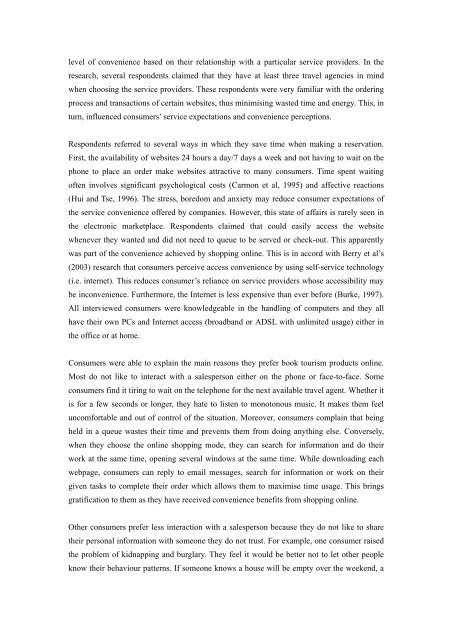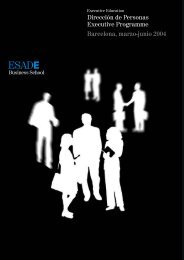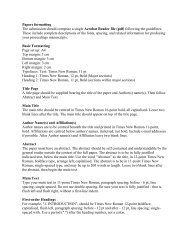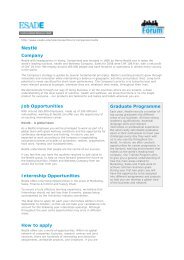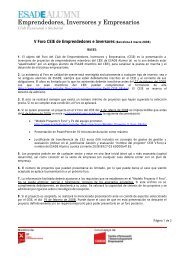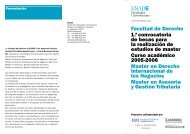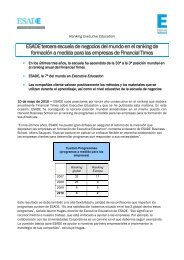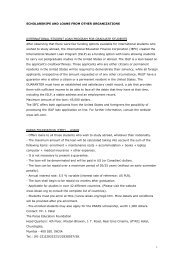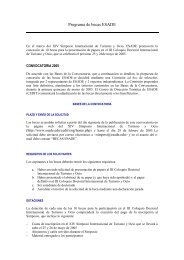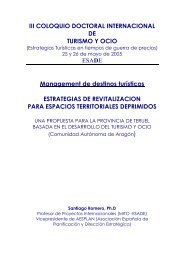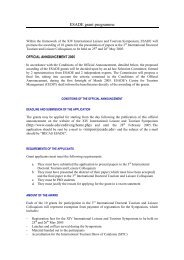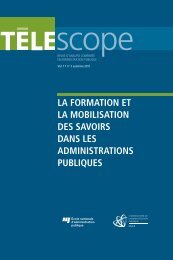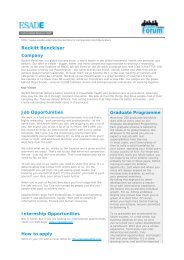taiwanese consumers' perception of service convenience ... - Esade
taiwanese consumers' perception of service convenience ... - Esade
taiwanese consumers' perception of service convenience ... - Esade
Create successful ePaper yourself
Turn your PDF publications into a flip-book with our unique Google optimized e-Paper software.
level <strong>of</strong> <strong>convenience</strong> based on their relationship with a particular <strong>service</strong> providers. In the<br />
research, several respondents claimed that they have at least three travel agencies in mind<br />
when choosing the <strong>service</strong> providers. These respondents were very familiar with the ordering<br />
process and transactions <strong>of</strong> certain websites, thus minimising wasted time and energy. This, in<br />
turn, influenced consumers’ <strong>service</strong> expectations and <strong>convenience</strong> <strong>perception</strong>s.<br />
Respondents referred to several ways in which they save time when making a reservation.<br />
First, the availability <strong>of</strong> websites 24 hours a day/7 days a week and not having to wait on the<br />
phone to place an order make websites attractive to many consumers. Time spent waiting<br />
<strong>of</strong>ten involves significant psychological costs (Carmon et al, 1995) and affective reactions<br />
(Hui and Tse, 1996). The stress, boredom and anxiety may reduce consumer expectations <strong>of</strong><br />
the <strong>service</strong> <strong>convenience</strong> <strong>of</strong>fered by companies. However, this state <strong>of</strong> affairs is rarely seen in<br />
the electronic marketplace. Respondents claimed that could easily access the website<br />
whenever they wanted and did not need to queue to be served or check-out. This apparently<br />
was part <strong>of</strong> the <strong>convenience</strong> achieved by shopping online. This is in accord with Berry et al’s<br />
(2003) research that consumers perceive access <strong>convenience</strong> by using self-<strong>service</strong> technology<br />
(i.e. internet). This reduces consumer’s reliance on <strong>service</strong> providers whose accessibility may<br />
be in<strong>convenience</strong>. Furthermore, the Internet is less expensive than ever before (Burke, 1997).<br />
All interviewed consumers were knowledgeable in the handling <strong>of</strong> computers and they all<br />
have their own PCs and Internet access (broadband or ADSL with unlimited usage) either in<br />
the <strong>of</strong>fice or at home.<br />
Consumers were able to explain the main reasons they prefer book tourism products online.<br />
Most do not like to interact with a salesperson either on the phone or face-to-face. Some<br />
consumers find it tiring to wait on the telephone for the next available travel agent. Whether it<br />
is for a few seconds or longer, they hate to listen to monotonous music. It makes them feel<br />
uncomfortable and out <strong>of</strong> control <strong>of</strong> the situation. Moreover, consumers complain that being<br />
held in a queue wastes their time and prevents them from doing anything else. Conversely,<br />
when they choose the online shopping mode, they can search for information and do their<br />
work at the same time, opening several windows at the same time. While downloading each<br />
webpage, consumers can reply to email messages, search for information or work on their<br />
given tasks to complete their order which allows them to maximise time usage. This brings<br />
gratification to them as they have received <strong>convenience</strong> benefits from shopping online.<br />
Other consumers prefer less interaction with a salesperson because they do not like to share<br />
their personal information with someone they do not trust. For example, one consumer raised<br />
the problem <strong>of</strong> kidnapping and burglary. They feel it would be better not to let other people<br />
know their behaviour patterns. If someone knows a house will be empty over the weekend, a


